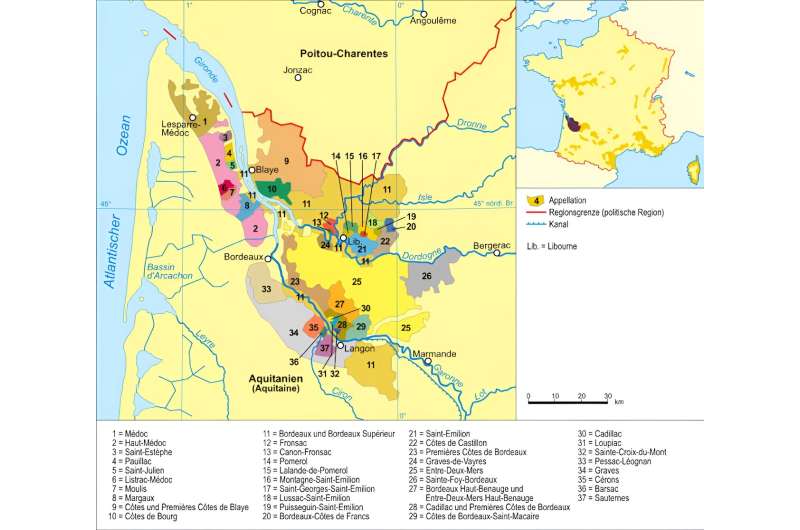This article has been reviewed according to Science X's editorial process and policies. Editors have highlighted the following attributes while ensuring the content's credibility:
fact-checked
trusted source
written by researcher(s)
proofread
Climate change may make Bordeaux red wines stronger and tastier

It's harvest time again for most of Europe's wine growing regions and grapes are being picked from the UK in the north to Sicily in the south. The grapes are then sorted and pressed to make the best juices possible. These juices will then be fermented in a choice of barrel, be that oak, concrete, clay or stainless steel, to make wine ready for blending and bottling in the spring.
The harvest determines the vintage, with variation in weather leading to changes in the appeal of the wines. Colleagues and I have published new research which examines this variation, looking at how quality is affected by temperature and rainfall.
Quality is assessed in spring, when the wine is finished in the barrel ready to be bottled. The French refer to this stage as en primeur (the first), and at this time a futures market forms where speculators and commercial buyers can purchase wine in advance. En primeur was started by Bordeaux wine merchants in the 1950s as a post-war method of providing money to financially struggling chateaus while the wine was still being bottled. This phenomenon has since spread across Europe.
During this period, wine merchants and critics make their assessments of the vintage. These assessments speak to both the character and the quality of the wine. The character aspect of reviews come in the form of tasting notes like fruits, velvety mouth-feel, and hints of spices to finish. The quality aspect is rated numerically in the form of a score, comparing the quality of this year's wines to both previous and other local wines.
These scores vary annually with both climate and weather changes, as well as from vineyard to vineyard. Wines produced from the same type of grape can still vary by soil type, microclimate or vinification (winemaking) choices. Some wine merchants and critics choose to score the wines by region, others by individual bottles of wine.
What makes Bordeaux better
We wanted to use these scores to explore how wine quality is changing with variation in annual weather, and thus gain a glimpse into the potential future for wine. We chose to do this in Bordeaux, the wine producing region surrounding the French city of the same name, where climate impacts have already been felt through earlier ripening and harvesting, increased water-related stress, and variation in wine quality.
Bordeaux is also perfect because of the scale of en primeur, with thousands of chateaus all taking part and being rated by a small number of high-profile critics.
Our results show that higher quality wine is made in years with warmer temperatures, more winter rainfall (and less summer rainfall), and earlier, shorter growing seasons. Climate change is expected to make these conditions occur more frequently, suggesting that—with caveats—Bordeaux wines will potentially become stronger, more rounded, and generally better in the years to come.
The Bordeaux wine region
We can see this general trend in the annual variation in critics' scores for the wines of St-Émillion, for example. One of Bordeaux's 37 specially-defined wine regions known as "appellations", St-Émillion, is famed for its high-quality wines and celebrated vineyards, with high values often associated with them.
If we examine one of the top chateaus from this area, Château-Figeac, we find that its highest rated years in the past decade—2016, 2019, and 2022—all had high temperatures and low rainfall in July and August, but also higher rainfall in the November-January before. Alexa Boulton, commercial director at Château-Figeac, told me that: "with climate change this type of year comes more often and therefore great vintages come more often".
Climate change also means more extremes
This all sounds very positive, but the caveats are quite important. Most notably, with increased climate change comes an increase in extreme events. Late frosts, extreme droughts and strong rain and hail during flowering and fruiting are all increasing in frequency in Bordeaux and can wipe out an entire year's grapes. This means no wine at all from some locations, a potentially wine-changing event.
We may have already seen this in 2020, when a dramatic April storm swept across Bordeaux, showering vines in hail and wiping out "up to 100%" of grapes on some vines while leaving others almost untouched. This hail is one potential reason for the slightly lower quality in many chateaus' 2020 vintages when compared to the 2019 vintages, despite high winter rainfall and summer temperatures.
Our findings apply far beyond Bordeaux. The UK, for instance, is on the cusp of producing great red wines yet is still impacted by changes in the weather. My friend Natasha Rompante is an English wine maker, she told me that "2020 was a hot year which made for a great vintage where we unusually achieved ripeness for both white and red wines".
However 2021 was a different story, with suspected climate change-related increases in temperature and humidity leading to widespread disease and loss of fruit. Rompante points out that "some vineyards lost up to 90% of their crop". The combination of temperature and rainfall is vital, with the right heat and water, at the right times.
As the global climate changes, so too will our wines. Our research has shown which weather conditions make better wine and this, with some potentially devastating caveats, could suggest a positive future for wines in Bordeaux. Whatever happens, developing our understanding of the links between climate, vine and wine is vital to ensuring long-term success for wines everywhere.
Provided by The Conversation
This article is republished from The Conversation under a Creative Commons license. Read the original article.![]()




















